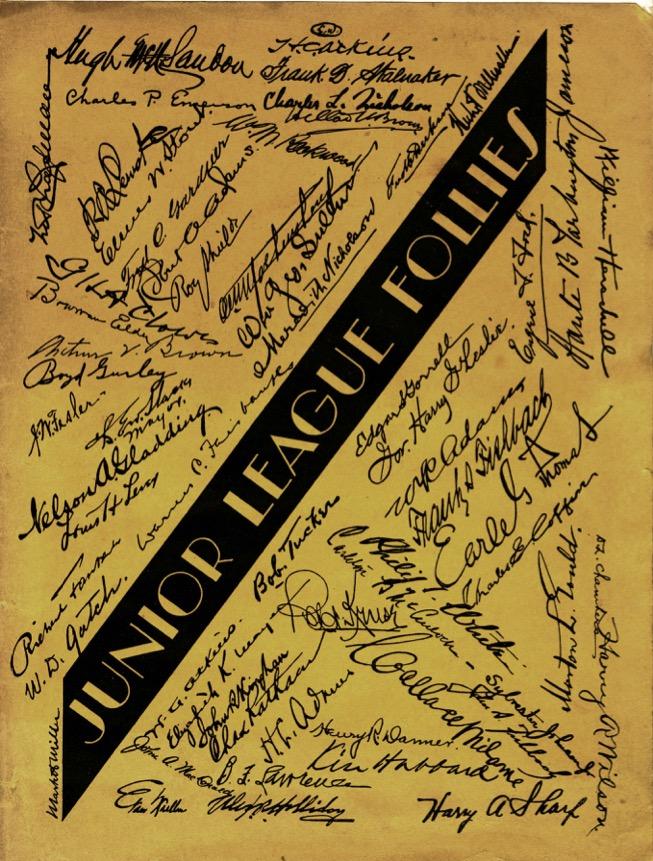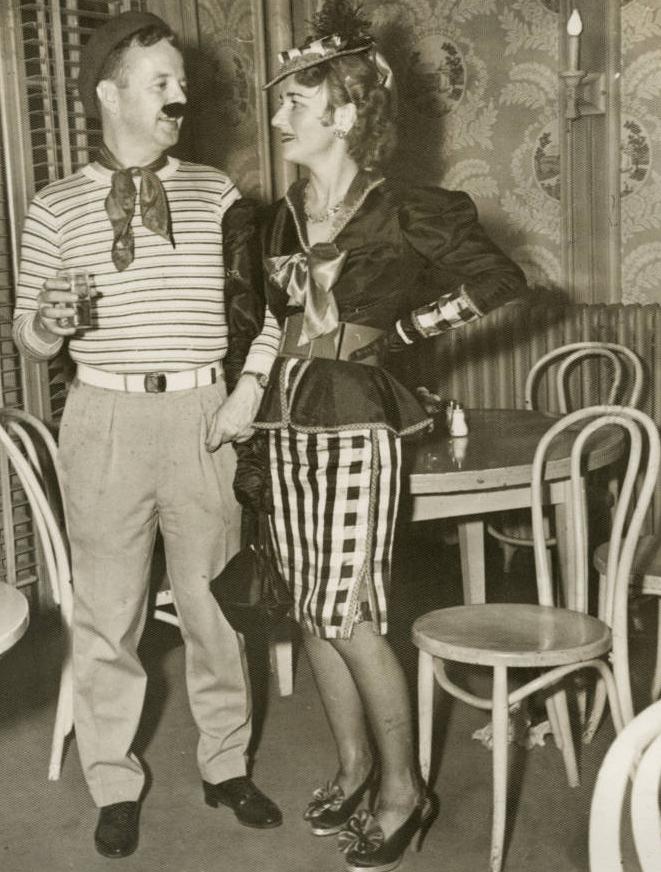The Junior League of Indianapolis (JLI) is a women’s organization that trains volunteers as community leaders to improve local social, economic, educational, and civic conditions. Its members develop and fund projects as well as help recruit and train volunteers within the community to staff and maintain the programs.
JLI was established as a charted league of the Association of Junior Leagues International on March 22, 1922, through the efforts of 10 women. This same year, the Exchange (later the Junior League Shop) opened on where the organization raised funds by selling hats, jellies, candies, and children’s books. The league was officially incorporated in 1924 with nearly 100 members.
The first of the major service projects undertaken by JLI involved the creation of the initial occupational therapy clinic at in 1924. The women organized, staffed, equipped, financed, and maintained the department. The success of the program led to the development of two more clinics at the Robert W. Long Hospital. JLI also established a trust fund in 1924 to aid handicapped children.

Throughout the rest of the 1920s, JLI took on other projects like transcribing books into Braille, providing speakers for events, and working with the Community Fund (now ). The league even published its own magazine in 1927, Outbursts from the Outcasts, as well as a news sheet called Pen & Inklings.
As the decade progresses, so did the league’s fundraising efforts. One of the first social fundraisers was a “Cabaret Dance” in 1924 which raised $2,000. The next year’s event, a “Pink Ball” at the , brought in the same amount. In 1926, the “Advertising Ball” at the made an $8,000 profit. The next several events included an “Easter Ball” (1927), a “Radio Ball and Cabaret” (1928) which made $10,000, and a “Rodeo and Horse Show” (1929) that netted $15,000. Outside of social events, JLI opened the Trading Post (later Next-to-New Shop) at 14th and Illinois Streets in 1928. The salvage shop made a profit of $1,600 in its first year.
By the 1930s, the league had 195 members and hosted its first regional conference. The League continued to be active at Riley as well as Long and Rotary Hospitals and the I.U. Medical Center. At this point, JLI began the process of turning over the Occupational Therapy Program to Riley by relinquishing one-third of its financial support.
Due to the Depression, the League Shop closed in 1934, and no other major fundraising events were attempted. By the end of the 1930s, however, multiple performances were held to raise funds, including “Number, Please” and “Gaieties of 1883.” Funding also came from the Trading Post (later named Next-to-New Shop). In 1938, all money-raising efforts began to be made in the name of the JLI Community Service Program to allow more freedom in how the organization used funds.
The Junior League’s membership rose to 289, though at this point many of those members were focused on both community and war efforts. The league began working with other groups such as Civilian Defense, Red Cross, and Citizens Service Corps and operated a War Stamp Booth at the Columbia Club and Wm. H. Block and Charles Mayer & Co. It also gave volunteer credit for members that served in war-related groups such as Day Car, Salvage, and Women’s Organization Committee of the Marion County War Savings Staff.

In 1944, JLI established its headquarters at the Winter Apartments on 1321 North Meridian Street. The league also took on several non-war-related projects during this time: the establishment of two childcare centers, public school presentations, supporting the Indiana Artists Show, and furnishing a waiting room at the Billings General Hospital. JLI also helped establish the James Whitcomb Riley Child Guidance Clinic in cooperation with the Indiana University School of Medicine in 1949 to provide treatment for emotionally disturbed children and training for child psychologists.
Throughout the 1950s and 1960s, the league continued raising funds and taking on community-focused projects such as parent education, public welfare, and the Lockfield Co-op Nursery. In the 1950s, JLI members embarked on a project with the Indiana State Library, sorting, organizing, and categorizing historic items. The League allocates funds to build moveable glass cases and create “History on the Move,” a traveling exhibit made available to the schools.
In addition to other fundraising efforts, JLI established the Christmas Boutique (later renamed Holiday Mart) in the 1960s which brought together 23 shops for a three-day, pre-holiday shopping event in October. The event raised over $16,000 for the Community Projects Fund. The Next-to-New shop was another source of funding, having its best year in 1964 with an $18,600 profit after moving to 42nd and College.
JLI hosted a community conference in 1966 that was focused on inspiring awareness of community problems, coordinating improvement of existing agencies, and motivating the community to solve its problems. Around 430 people from a variety of local community organizations gathered at the Athletic Club to attend the conference.
In 1972, JLI celebrated its 50th anniversary with a “Golden Ball.” The league, which by this point had over 700 members, spent the rest of the decade working with groups like the International Center, Big Sisters, and the International Advanced Transit Association. They organized carpooling to aid in the fuel shortage, provided extension lectures to schools, and developed educational programs with the Eagle Creek Nature Center.
In 1976 and 1977, collaborating with the and the , JLI helped produce pamphlets and walking tours of historic homes in the and neighborhoods. JLI ended the 1970s by setting forth three new goals: increasing their impact on their community, increasing their training activities, and keeping their members satisfied. They also were given a new location for their headquarters in 1979, the Schnull-Rauch House at 3050 North Meridian.
In April 1981, JLI officially moved into their new headquarters, though the restoration of the house was not complete until 1983. Committed to providing the best possible experience for their members, JLI raised the maximum age for admission to 45 and changed the requirement for members older than 40 years of age to only have to participate in one project as part of active membership.
The league participated in several events throughout the 1980s: the National Sports Festival in 1982, the National League of Cities Convention held in Indianapolis in 1984, the United States Figure Skating Association’s National Championships in 1987, and the Pan American Games in 1987. New projects included Riley Child Life Services, Domestic Violence Network, Dyslexia Remedial Association, and Youth Institute as well as joining forces with the Commission for Downtown and Historic Landmarks to form the Circle Theatre Associates to renovate and operate the Circle Theatre.
In 1986, the Next-to-New shop was moved to its final location on Hillside Avenue. This same year, JLI began a new fundraising event, American Dialogue, which earned $32,000 in its first year. It also initiated an endowment fund in 1988 to provide long-term funding for the organization, which raised over $65,000 in its first year.
JLI membership continued to grow into the 1990s. In June 1993, included 105 provisional, 459 active, and 804 sustaining members. A Leadership Course was formed to mentor league members and prepare them for leadership roles within JLI and their community. The JLI Endowment also gained a million-dollar gift. The Holiday Mart continued to be a large fundraiser and the publication of JLI’s cookbook Back Home Again was a success, printing in 1993 and 1998 for a total of 40,000 copies.
With so many resources available, the league was able to continue its work aiding the community. JLI aided on a diverse range of projects throughout the decade, but it was the Gennesaret Free Clinic that earned the league President Bush’s Points of Light Award.
In the early 2000s, membership requirements were adjusted to completely eliminate upper age limits. The Next-to-New shop was closed so that the league could focus on other projects, and JLI sold the Schnull-Rauch House. New projects during this time included various events and programs like the World Police and Fire Games, the Julian Center Art Therapy, Storytelling Arts of Indiana, Indiana Women’s Prison Mentoring Children, Kids in the Kitchen, and Weekend to End Breast Cancer.
As of 2020, the organization had a membership of 731 women. JLI has remained committed to the health and education of children and families, investing in , the Indiana Affiliate of Young Audiences, and also has worked with the Patachou Foundation to support after-school meal programs for students who attend the indianapolis public schools.

Help improve this entry
Contribute information, offer corrections, suggest images.
You can also recommend new entries related to this topic.

